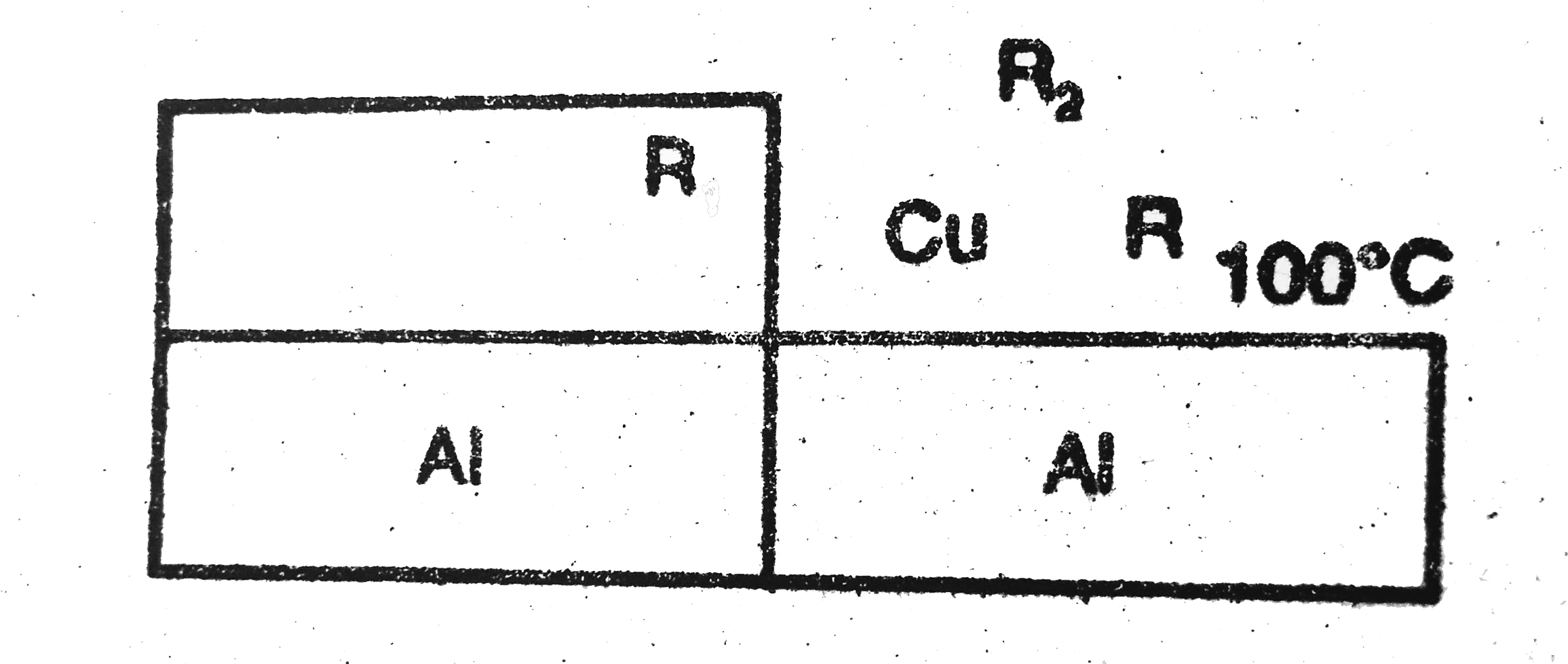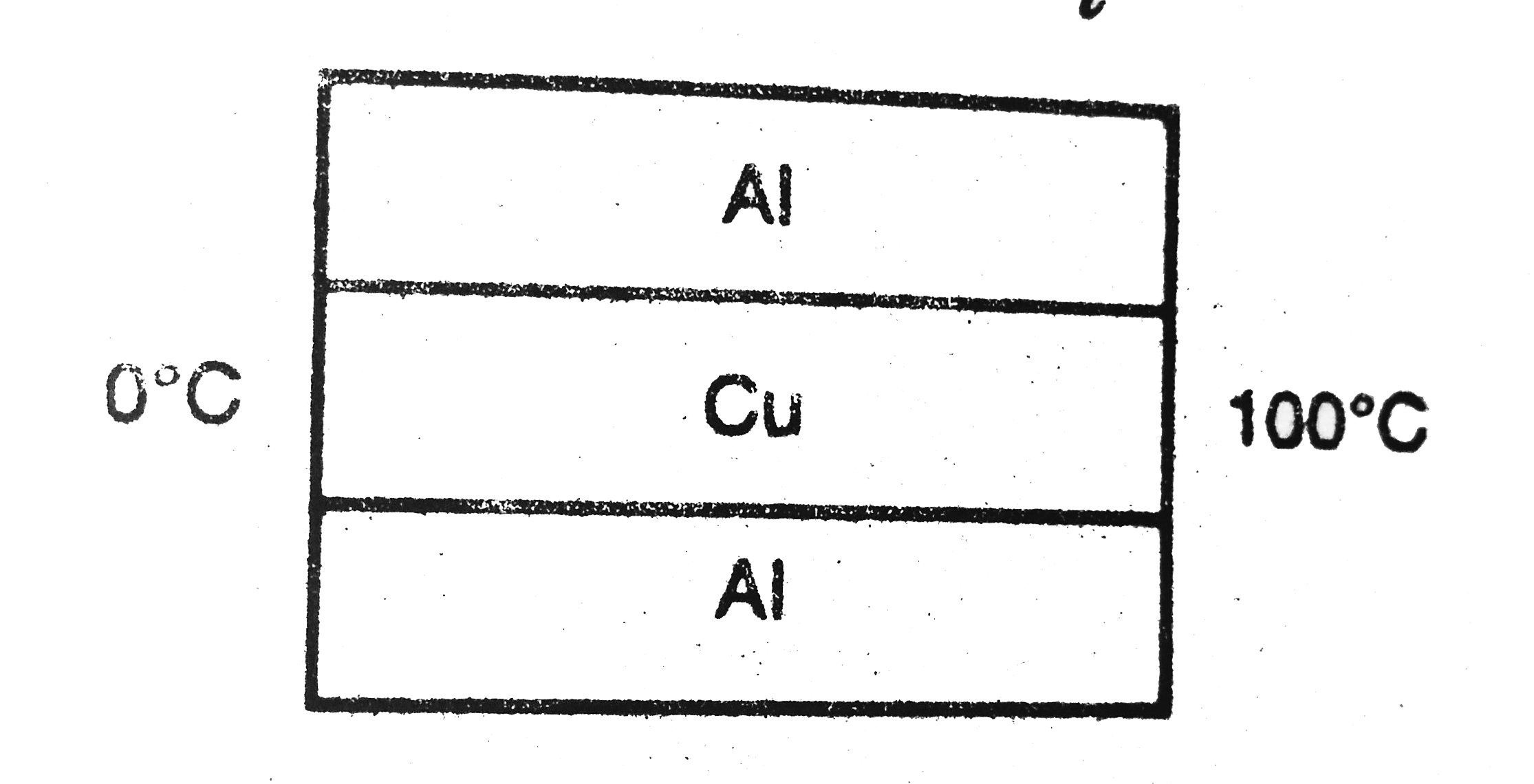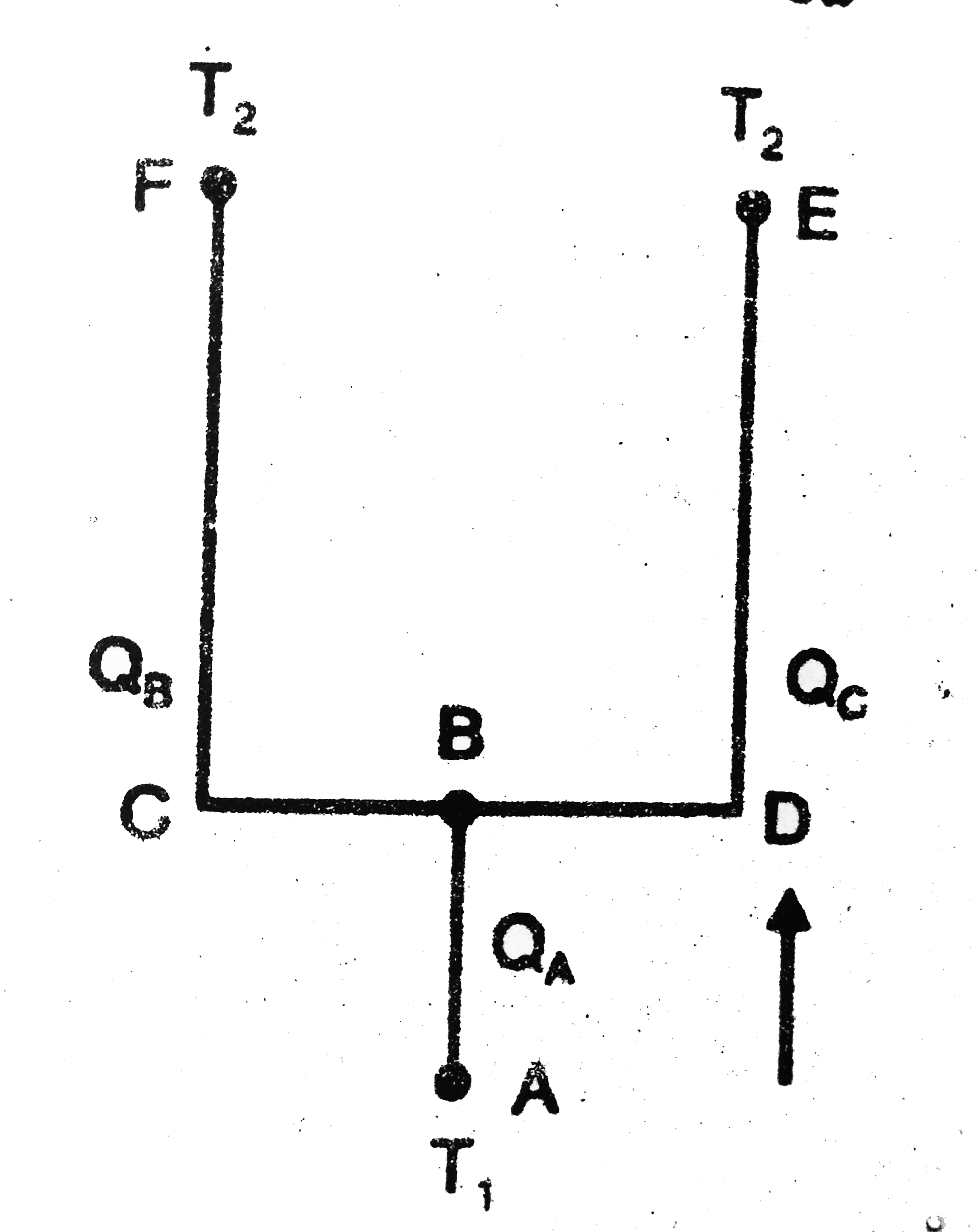The three rods shown in figure have identical geometrical dimensions. Heat flows from the hot end at a rate of 40W in the arrangement (a). Find the rates of heat flow when the rods are joined as in arrangement (b) and in (c). Thermal conductivities of aluminium and copper are `200Wm^(-1)`^(@)C^(-1)` and `00Wm^(-1)`^(@)C^(-1)` respectively.

The three rods shown in figure have identical geometrical dimensions. Heat flows from the hot end at a rate of 40W in the arrangement (a). Find the rates of heat flow when the rods are joined as in arrangement (b) and in (c). Thermal conductivities of aluminium and copper are `200Wm^(-1)`^(@)C^(-1)` and `00Wm^(-1)`^(@)C^(-1)` respectively.


Text Solution
Verified by Experts
The correct Answer is:
D
`theta_1=theta_2=100`
`(Q)/(T)=(Ka(theta_1-theta_2))/(t)`
`R=R_1+R_2+R_3` ltbrge =1/(ak_Al)+1/(ak_cu)+1/(ak_Al)`
`=1/a((2/200)+(1/400))`
`1/a((4+1)/400)=1/a 5/400`
`=1/a 1/80`
`Q/t=100/((1/a) (1/80))[:' Q/t=(theta_1-theta_2)/R]`
`40=80xx100xx(a/l)`
`[from question Q/t =40 W.]`
`a/l=1/200`
`for, B `R=R_1+R_2+R_3`
`=R_Al+(R_Cu R_Al)/R_Cu+R_Al)`
`=1/(aK_(Al))+((1)/(aK_(Cu)).(1)/(aK_(Al)))/((1)/(aK_(Cu)).(1)/(aK_(Al)))`
`=1/(aK_(Al))+(l)/(a(K_(al)+aK_(Cu))`
`=1/a((1)/(200)+(1)/(200+400))`
`=1/a((1)/(200)+(1)/(600))`
``=1/a((3+1)/(600))=(4/600).(l/a)`
`(Q/t)=(theta_1-theta_2)/R=(100)/((l/4) (4/600))`
`=(600xx100)/4xx(a/l)`
`=(300/4)=75[Using (a/l)=1/200)]`
`For C (1/R)=(1/R_1)+(1/R_1)+(1/R_1)`
`=(1//l)/(ak_(Al))+(1//l)/(ak_(Cu))+(1//l)/(ak_(Al))`
`=(K_(Al)+K_(Cu)+K_(Al)).(a/l)`
`=(2xx200xx400)(a/l)`
`=(a/l)(800)`
`implies R=(a/l)(1/800)`
`(Q/t)=(theta_1-theta_2)/R=(100)/((l/a)(1/800))`
`=(100xx800xxa)/l`
`=(100xx800)/200=400W.`




`(Q)/(T)=(Ka(theta_1-theta_2))/(t)`
`R=R_1+R_2+R_3` ltbrge =1/(ak_Al)+1/(ak_cu)+1/(ak_Al)`
`=1/a((2/200)+(1/400))`
`1/a((4+1)/400)=1/a 5/400`
`=1/a 1/80`
`Q/t=100/((1/a) (1/80))[:' Q/t=(theta_1-theta_2)/R]`
`40=80xx100xx(a/l)`
`[from question Q/t =40 W.]`
`a/l=1/200`
`for, B `R=R_1+R_2+R_3`
`=R_Al+(R_Cu R_Al)/R_Cu+R_Al)`
`=1/(aK_(Al))+((1)/(aK_(Cu)).(1)/(aK_(Al)))/((1)/(aK_(Cu)).(1)/(aK_(Al)))`
`=1/(aK_(Al))+(l)/(a(K_(al)+aK_(Cu))`
`=1/a((1)/(200)+(1)/(200+400))`
`=1/a((1)/(200)+(1)/(600))`
``=1/a((3+1)/(600))=(4/600).(l/a)`
`(Q/t)=(theta_1-theta_2)/R=(100)/((l/4) (4/600))`
`=(600xx100)/4xx(a/l)`
`=(300/4)=75[Using (a/l)=1/200)]`
`For C (1/R)=(1/R_1)+(1/R_1)+(1/R_1)`
`=(1//l)/(ak_(Al))+(1//l)/(ak_(Cu))+(1//l)/(ak_(Al))`
`=(K_(Al)+K_(Cu)+K_(Al)).(a/l)`
`=(2xx200xx400)(a/l)`
`=(a/l)(800)`
`implies R=(a/l)(1/800)`
`(Q/t)=(theta_1-theta_2)/R=(100)/((l/a)(1/800))`
`=(100xx800xxa)/l`
`=(100xx800)/200=400W.`




Topper's Solved these Questions
Similar Questions
Explore conceptually related problems
The three rods shown in figure have identica dimensions. Heat flows from the hot end at a rain of 40 W in the arrangement (a). Find the rates of heat flow when the rods are joined as in arrangement (b). (Assume k_(AJ) = 200 W/m ‘^(@)C and K_(Cu) = 400 Wim ‘^(@)C )
Find the rate of heat flow through a cross section of the rod shown in figure (theta_(2)gttheta_(1) . Thermal conductivity of the material of the rod is K.
An aluminium rod and a copper rod of equal length 1.0 m and cross-sectional area. 1cm^(2) are welded together as shown in figure. One end is kept at a temperature of 20^(@)C and the other at 60^(@)C Calculate the amount of heat taken out per second from the hot end. thermal conuctivity of aluminium =200Wm^(-1) ^(@)C^(-1) and of copper =390Wm^(-1) ^(@)C^(-1) .
Three rods of material x and three of material y are connected as shown in figure. All the rods are identical in length and cross sectional area. If the end A is maintained at 60^(@)C and the junction E at 10^(@)C , calculate the temperature of the junction B. The thermal conductivity of x is 800Wm^(-1) ^(@)C^(-1) and that of y is 400Wm^(-1) ^(@)C^(-1) .
Find the thermal resistance of an aluminium rod of length 20cm and area of cross section 1cm^(2) . The heat current is along the length of the rod. Thermal conductivity of aluminium =200Wm^(-1)K^(-1) .
Figure shows an aluminium rod joined to a copper rod. Each of the rods has a length of 20cm and area of ccross section 0.20cm^(2) . The junction is maintained at a constant temperature 40^(@)C and the two ends are maintained at 80^(@)C . Calculate the amount of heat taken out from the cold junction in one minute after the steady state is reached. The conductivities are K_(Al)=200Wm^(-1) ^(@)C^(-1) . and K_(Cu)=400Wm^(-1) ^(@)C^(-1) .
Find the thermal resistance of an aluminium rod of length 0.20 m and area of cross section 1xx10^(-4)m^(2) . The heat current is along the length of the rod. [Thermal conductivity of aluminium =200Wm^(-1)K^(-1) ]
Figure shows a copper rod joined to a steel rod. The rods have equal length and and the equal cross sectional area. The free end of the copper rod is kept at 0^(@)C and that of the steel rod is kept at 100^(@)C . Find the temperature at the junction of the rods. conductivity of copper =390WM^(-1) ^(@)C^(-1) and that of steel =46Wm^(-1) (@)C^(-1) .
One face of a copper cube of edge 10 cm is maintained at 100^(@)C and the opposite face is maintained at 0^(@)C . All other surfaces are covered with an insulating material. Find the amount of heat flowing per second through the cube. Thermal conductivety of copper is 385Wm^(-1) ^(@)C^(-1) .
Two rods of same material and thickness are joined as shown below. The ends X and Y are maintained at X^(@)C and Y^(@)C respectively. The ratio of the heat flow in the two rods is –